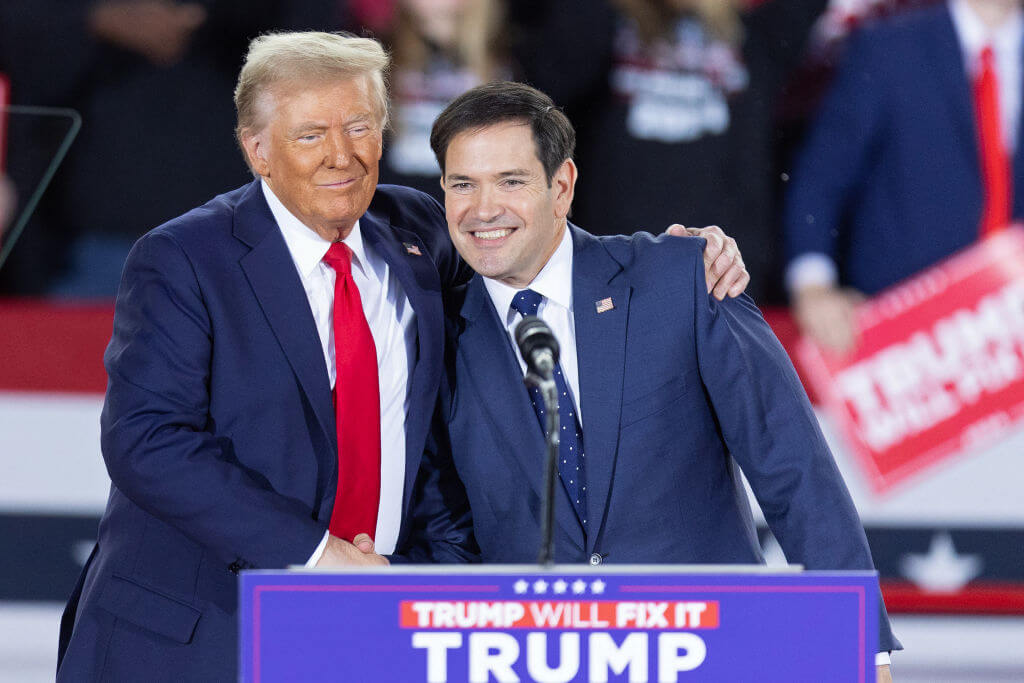Sen. Marco Rubio (R-FL) speaks during a Trump rally on Nov. 04, 2024. Photo by Chip Somodevilla/Getty Images
This article was originally published on Nov. 11, 2024, and has been updated ahead of Senator Rubio’s confirmation hearing.
Sen. Marco Rubio, a Republican from Florida who serves on the Senate Foreign Relations Committee, is expected to face a friendly audience from that panel when it convenes Wednesday to consider his nomination as secretary of state in the second Trump administration.
Democrats on the panel will likely question Rubio on the key foreign policy goals that President-elect Donald Trump outlined during last year’s campaign and since his election in November, including his strong desire to end the wars in Ukraine and Gaza, part of an isolationist approach that dominates his inner circle.
Trump’s national security picks are die-hard Israel supporters, some of whom have denied the existence of the Palestinian people and back the annexation of the occupied West Bank.
What a Rubio nomination would mean for Israel
Rubio ran for president in 2016 as a foreign policy hawk. He criticized Trump back then for pledging to be “neutral” on the Israel-Palestinian conflict. However, in recent years, he has moderated his views, aligning more closely with Trump’s populist agenda. In an interview last year, Rubio said his foreign policy has evolved as “the world looks different than it did five, 10, 15 years ago.”
He surprised former supporters and donors with his April vote against emergency funding. Rubio argued that the foreign aid package should have included border enforcement measures, and objected to its linkage with aid for Ukraine and Taiwan, a decision that aligned with Trump’s base.
Despite this, Rubio’s vocal support for Israel remains consistent. As vice chairman of the Senate Intelligence Committee, he visited Israel in April, and in November 2023 co-hosted a bipartisan screening for members of Congress of the film documenting atrocities committed by Hamas on Oct. 7. Rubio likened the Israel Defense Forces’ ground operation in Rafah, which was opposed by the Biden administration, to the Allies’ pursuit of Adolf Hitler during the Holocaust.
In a video posted by Code Pink earlier this year, Rubio said he expected Israel “to destroy every element of Hamas.”
Rubio’s nomination will require Senate confirmation. Republicans will have a 53-47 majority to approve the pick.
Rubio’s complex relationship with Jews

Born in Miami to Cuban parents who baptized him as a Catholic, Rubio spent three years of his youth as a Mormon. He has maintained a close relationship with Jewish communities in Florida, estimated at 5% of the state’s electorate.
Norman Braman, an auto dealership magnate and past president of the Greater Miami Jewish Federation, was Rubio’s political patron and the single-largest backer of his presidential campaign in 2016. In 2015, Democrats in Florida criticized Rubio for holding a fundraising event on Yom Kippur at the Texas home of Harlan Crow, a conservative philanthropist whose art collection includes works by Adolf Hitler, a signed copy of Mein Kampf and some lines and china used by the Nazi leader.
Rubio is a longtime supporter of Orthodox Jewish and other religious causes. But he also angered Orthodox leaders in 2022 for introducing a bill that would make daylight saving time permanent across the nation, which would have made it more difficult for people to attend morning prayers and get to work on time. (The bill passed unanimously in the Senate but stalled in the House.)
Rubio excused Trump after he repeatedly accused American Jews of disloyalty to Israel and suggested they hate their religion by voting for Democrats. “Being your religion and being pro-Israel can be two separate things,” Rubio said on CBS News Face the Nation in March. He accused President Joe Biden of trying to appeal to “antisemites” in the Democratic party by critiquing Israel’s war in Gaza.
The Florida senator said he supports Trump’s plan to deport foreign students who engage in fomenting the pro-Palestinian campus protests. In April, he called for punishing supporters of the Israel boycott movement in efforts to counter growing antisemitism.
Last fall, as criticism mounted over TikTok’s role in amplifying antisemitic and anti-Israel content after Oct. 7, Rubio wrote on X: “TikTok is a tool China uses to spread propaganda to Americans, now it’s being used to downplay Hamas terrorism.” He had taken a leading role in a congressional effort to ban TikTok in 2022.

I hope you appreciated this article. Before you go, I’d like to ask you to please support the Forward’s award-winning, nonprofit journalism so that we can be prepared for whatever news 2025 brings.
At a time when other newsrooms are closing or cutting back, the Forward has removed its paywall and invested additional resources to report on the ground from Israel and around the U.S. on the impact of the war, rising antisemitism and polarized discourse.
Readers like you make it all possible. Support our work by becoming a Forward Member and connect with our journalism and your community.
— Rachel Fishman Feddersen, Publisher and CEO













